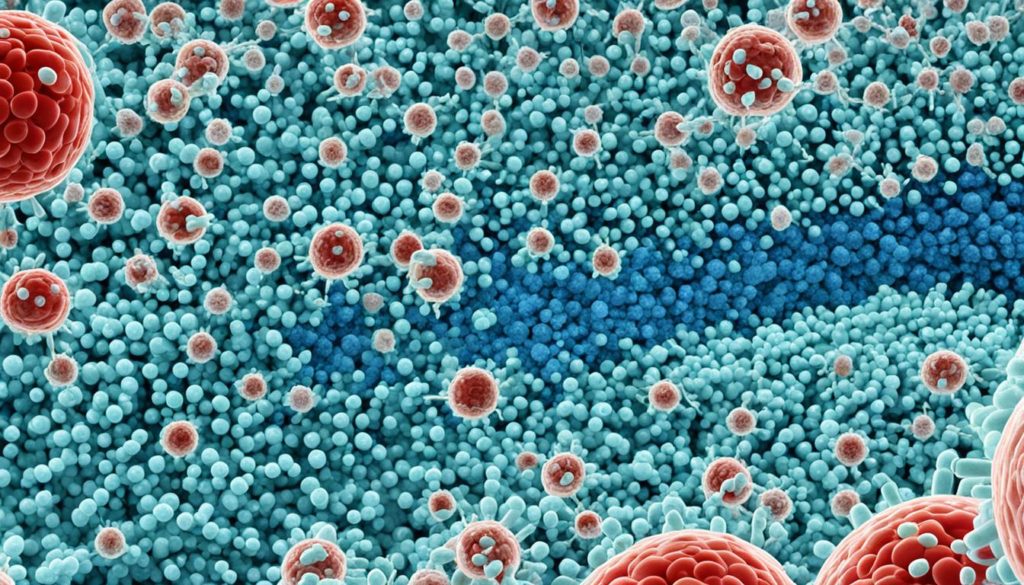Managing diabetes often means using more than just insulin. Pramlintid, or Symlin, is a special diabetes medicine. It helps people who can’t control their blood sugar with insulin alone. This treatment is great for those with type 1 or type 2 diabetes who aren’t managing their sugar levels well. Pramlintid works with insulin to help control blood sugar better.
Pramlintid is a synthetic version of a hormone called amylin. It helps keep blood sugar stable by slowing down how fast food leaves the stomach, reducing the hormone glucagon, and making you feel full. This makes Pramlintid a key part of managing diabetes. It helps control blood glucose levels more effectively. Knowing how to use Pramlintid is important for better diabetes care.
Key Takeaways
- Pramlintid (Symlin) is a diabetes medication used alongside insulin for better blood sugar regulation.
- It is suitable for individuals with type 1 or type 2 diabetes.
- This drug acts as a synthetic form of amylin, a hormone that complements insulin.
- Pramlintid helps in slowing gastric emptying, suppressing glucagon secretion, and promoting satiety.
- Incorporating Pramlintid can lead to improved diabetes management and glucose control.
Introduction to Pramlintid (Symlin)
In the world of diabetes treatment, the introduction of Pramlintid is a big step forward. Known as Symlin, this man-made version of the human hormone amylin got the green light from the FDA in 2005. It’s now a key part of managing diabetes.
Pramlintid, or Symlin, helps insulin work better to control blood sugar. It’s important because managing diabetes is complex and insulin alone isn’t enough. Symlin is part of a broader approach to keep blood sugar levels in check.
Since getting FDA approval, Symlin has become more popular for making insulin therapy more effective. It helps lower blood sugar spikes after meals, a big issue in diabetes care. This shows how vital Symlin is for a full diabetes treatment plan.

How Pramlintid Works for Diabetes Management
Pramlintide is a synthetic version of amylin, a hormone that diabetes patients lack. It works with insulin to help manage diabetes. This makes it a key part of diabetes treatment.

Pramlintide Mechanism of Action
Pramlintide acts like amylin, slowing down how fast food leaves the stomach. This helps control blood sugar levels after eating. It also lowers glucagon, which makes the liver produce less glucose.
The Role of Amylin in Blood Sugar Regulation
Amylin is key to keeping blood sugar stable. It slows down food movement, helping blood sugar levels rise slowly after meals. This prevents sudden spikes and keeps levels steady.
Interaction with Insulin
Pramlintide and insulin work together to control blood sugar. Insulin helps glucose get into cells. Pramlintide slows down stomach emptying and lowers glucagon levels. This combination makes blood sugar control better and lowers insulin use.
| Function | Insulin | Pramlintide |
|---|---|---|
| Primary Action | Glucose uptake into cells | Slowing gastric emptying, reducing glucagon |
| Timing of Effect | Quick onset | Post-meal moderation |
| Main Benefit | Lower blood glucose levels | Steady blood glucose levels |
Benefits of Pramlintid for Diabetes Control
Pramlintid (Symlin) is a key part of diabetes care. It brings many benefits that help patients manage their diabetes better. Let’s look at the Pramlintide benefits that make it a great choice for diabetes care.
Improved Blood Sugar Control
Pramlintid helps control blood sugar levels. It works like a hormone called amylin to balance out spikes in blood sugar after meals. This keeps blood sugar stable and lowers the chance of high blood sugar after eating.
Keeping blood sugar control in check is key to avoiding serious diabetes problems later on.
Weight Management
Pramlintid also helps with diabetes weight management. Many people with diabetes are overweight or obese. Pramlintid can help control appetite, which can lead to losing weight or keeping weight stable. This is good for overall health and diabetes control.
Reduction in Insulin Requirements
Pramlintid can also mean using less insulin. It makes insulin work better, so you might not need as much of it. Studies show that people taking Pramlintid often reach their blood sugar goals with less insulin.
This means less insulin therapy and a lower risk of low blood sugar.
In short, adding Pramlintid to diabetes treatment offers big benefits. These include better blood sugar control, help with diabetes weight management, and the chance to use less insulin. These advantages make diabetes care more effective and complete.
Pramlintid Dosage and Administration
Managing diabetes with Pramlintid means knowing the right Pramlintide dosage, administration guidelines, and how to monitor the dosage. We’ll cover these important topics to help patients and caregivers get the most from Pramlintid.
Choosing the Right Dosage
Finding the right Pramlintide dosage is crucial for diabetes care.
Doctors look at BMI, blood sugar swings, and current insulin use. They start with a small dose to check how well the body takes it and to avoid side effects. Then, they adjust based on how the patient feels and blood sugar levels.
- 15 mcg for Type 1 diabetes patients
- 60 mcg for Type 2 diabetes patients
It’s important to keep up with doctor visits to adjust the dosage for the best results and safety.
Administration Guidelines
Pramlintid is given as an injection under the skin, usually in the belly or thigh. This way, it slowly gets into the bloodstream, helping control blood sugar. Important rules for giving Pramlintid include:
- Injecting Pramlintid before meals
- Switching where you inject to avoid fat deposits
- Making sure you inject it right for better absorption
Following these guidelines helps keep blood sugar stable after meals and makes Pramlintid work better for diabetes.
Monitoring and Adjustments
Keeping an eye on the dosage is key for Pramlintid to work well. Patients should check their blood sugar, especially after eating, to see how Pramlintide affects them. Then, they can change the dosage with their doctor’s help.
Essential Monitoring Practices Include:
- Checking blood sugar often, especially after meals
- Noting any low blood sugar and adjusting the dose
- Meeting with doctors regularly to check how the dosage is working
By following these steps, people can make smart choices to manage their diabetes with Pramlintid.
| Pramlintide Dosage | Administration Guidelines | Dosage Monitoring |
|---|---|---|
| 15-60 mcg starting dose | Subcutaneous injection | Postprandial glucose checks |
| Individualized adjustments | Rotate injection sites | Regular consultations |
| Based on BMI and response | Pre-meal administration | Monitor hypoglycemia |
Understanding Pramlintid (Symlin) Side Effects
When managing diabetes with Pramlintid (Symlin), knowing about side effects is key. Learning about them helps patients handle them better. This can make treatment more effective and improve health.
Common Side Effects
Symlin common side effects include nausea, feeling less hungry, and headaches. These issues often lessen as you get used to the medicine. If these side effects don’t go away or get worse, talk to your doctor.
Serious Side Effects
Some Pramlintide side effects can be serious, like severe low blood sugar and allergic reactions. Low blood sugar is a big concern when using Symlin with insulin. Know the signs of low blood sugar—like feeling confused, seeing things differently, or feeling faint. Act fast if you see these signs.
Learn more about zinc and its role in health by reading this article. It talks about zinc’s importance and how it affects diabetes.
Managing Side Effects
Managing side effects involves education, starting with small doses, and adjusting insulin as needed. Starting with small doses can ease stomach issues. Adjusting insulin helps avoid low blood sugar. Always talk to your doctor if you have any bad reactions.
- Education: Learning about side effects and how to deal with them helps patients stick to their treatment.
- Gradual Dosing: Increasing the dose slowly lets your body adjust, making it easier to handle.
- Insulin Adjustment: Making small changes to insulin at mealtime can prevent low blood sugar.
By taking steps to manage side effects, patients can better control their diabetes. This improves their quality of life.
| Side Effect | Description | Management Strategy |
|---|---|---|
| Nausea | A common side effect in the stomach | Start with small doses |
| Severe Hypoglycemia | A big drop in blood sugar levels | Adjust insulin at mealtime |
| Allergic Reactions | Severe reactions like rash or trouble breathing | Get medical help right away |
Understanding and managing Symlin common side effects and serious Pramlintide side effects helps patients manage diabetes better. This leads to fewer problems.
Pramlintid vs Insulin: A Comparative Analysis
Both Pramlintid (Symlin) and insulin are key in managing diabetes. They help control blood sugar levels and work well together in treatment plans. This makes it easier for patients and doctors to make the right choices.
Efficiency in Blood Sugar Control
Pramlintid and insulin are both important for managing blood sugar. Pramlintid slows down how fast food leaves the stomach and makes you feel full. This helps keep blood sugar stable after meals. Insulin helps cells take in glucose, which lowers blood sugar right away.
When we compare them, we see they each have unique benefits. Pramlintid is great for controlling spikes in blood sugar after eating. Insulin is key for managing blood sugar levels overall.
Different Use Cases
Pramlintid is mainly for people with type 1 and type 2 diabetes who use insulin. It helps control blood sugar after meals. Insulin is a must-have for many with type 1 diabetes and is often needed for type 2 diabetes too.
Using Pramlintid and insulin together shows how they fit into different treatment plans. This approach meets the unique needs of various patients.
Combination Therapy
Using Pramlintid and insulin together works well for managing diabetes. This combo helps control blood sugar levels all day. Pramlintid helps with spikes after meals, while insulin manages blood sugar levels overall.
Let’s look at how Pramlintide and insulin compare in diabetes treatment in this table:
| Parameters | Pramlintid | Insulin |
|---|---|---|
| Primary Mechanism | Amylin analog, slows gastric emptying | Hormone, promotes glucose uptake |
| Use in Diabetes Types | Type 1, Type 2 | Type 1, Type 2 |
| Effect on Postprandial Glucose | Helps stabilize levels | May require bolus for spikes |
| Combination Therapy | Effective with insulin | Supported with Pramlintide |
Obtaining a Pramlintid Prescription
Getting a Pramlintid (Symlin) prescription needs careful thought and a talk with your doctor. This guide will walk you through what you need to do and think about.
Consulting with Healthcare Providers
Talking to a healthcare provider is key to see if Pramlintid fits your diabetes care plan. They will look at your medical history, what medicines you’re taking now, and your overall health. Make sure to talk about any worries you have about taking Pramlintid and how it might work with your other medicines.
Prescription Requirements
To get a Pramlintid prescription, you need to meet some requirements. Your doctor will check if you’re a good candidate based on certain criteria, such as:
- A confirmed diagnosis of type 1 or type 2 diabetes
- Current insulin therapy adherence
- No significant contraindications, such as severe hypoglycemic episodes
- Willingness to monitor blood sugar levels regularly
If you meet these conditions, your doctor will give you a prescription. You can then fill it at your pharmacy.
Cost and Insurance Coverage
Knowing how much Pramlintid costs is important. Many people worry about the cost. Here’s a table that explains the cost and coverage:
| Factor | Details |
|---|---|
| Out-of-pocket cost | The price you pay without insurance, which can vary significantly depending on your pharmacy. |
| Insurance coverage | Most diabetes medication insurance plans cover Pramlintid, but it’s advisable to check with your provider for specific coverage details. |
| Manufacturer assistance programs | Some pharmaceutical companies offer programs to help reduce the cost of medications for eligible patients. |
Getting Pramlintid to be affordable often means using insurance and manufacturer programs together. For more info on Pramlintid prescriptions, talk to your healthcare provider.
Knowing these things will help make adding Pramlintid to your diabetes treatment plan smoother.
Real-World Case Studies and Experiences
Real-world case studies and personal accounts show how Pramlintide helps manage diabetes. They offer insights for patients and healthcare providers. These stories highlight the different ways this medication can help people with diabetes.
“After starting Pramlintide, I noticed a significant improvement in my blood sugar control. The spikes and crashes that were once common became more manageable, and my overall energy levels improved.” – A Patient’s Testimonial
These testimonials show how Pramlintide can change lives for people with type 1 or type 2 diabetes. Studies and personal stories prove that adding Pramlintide to a diabetes treatment plan can greatly improve health.
Healthcare providers have seen great results in many Pramlintide case studies. These cases show that people need less insulin and have better HbA1c levels. They also report better weight control and more stable blood sugar levels, showing Pramlintide’s benefits.
A closer look at patient feedback and data from these studies shows better health and diabetes control. This information helps create better treatment plans based on solid evidence.
Conclusion
Pramlintid (Symlin) is key in managing diabetes. It helps control blood sugar and manage weight. This diabetes control advancement gives people more ways to manage their diabetes.
Using Pramlintide correctly can lead to better blood sugar levels and less insulin use. Side effects are manageable with doctor’s help. Studies show it works well in real life, compared to insulin.
People using Symlin see better diabetes control. It’s best used with a full treatment plan. Keeping up with new info and custom care is crucial. For more on treating diabetes, check out this health guide.
FAQ
What is Pramlintid (Symlin) used for?
Pramlintid (Symlin) is a medicine used with insulin for type 1 and type 2 diabetes. It helps control blood sugar better. It’s good for those who can’t manage their blood sugar with insulin alone.
How does Pramlintid (Symlin) work?
Pramlintid (Symlin) is like a man-made version of a hormone called amylin. It slows down how fast food leaves the stomach, lowers the hormone glucagon after eating, and makes you feel full. These actions help keep blood sugar stable and reduce spikes after meals.
What are the benefits of using Pramlintid for diabetes control?
Pramlintid helps control blood sugar, lowers spikes after meals, and may help with weight management. It can also make you need less insulin because it makes insulin work better.
How should Pramlintid (Symlin) be administered?
You give Pramlintid as an injection under the skin before big meals. Follow your doctor’s advice on dosage and timing to get the best results and avoid side effects.
What are the common side effects of Pramlintid?
Side effects include nausea, vomiting, and feeling less hungry. These usually go away as your body gets used to the medicine.
Can Pramlintid cause serious side effects?
Yes, serious side effects like severe low blood sugar, especially with insulin, can happen. Rare but serious issues include allergic reactions and pancreatitis. Watch for these and talk to your doctor if you notice them.
How do I determine the right dosage for Pramlintid?
Your doctor will decide the right dose based on your needs and how your body reacts. Start with a small dose and increase it slowly under your doctor’s watch.
Is there a difference between Pramlintid and insulin in diabetes management?
Yes, Pramlintid and insulin work differently. Insulin lowers blood sugar by helping cells take it in. Pramlintid mimics a hormone to control sugar levels after meals. They can be used together for better control.
How can I obtain a prescription for Pramlintid?
Talk to a healthcare provider about Pramlintid if you have diabetes. They’ll check your health and decide if it’s right for you. They’ll give you a prescription and tell you how much to take.
Will my insurance cover Pramlintid (Symlin)?
Insurance coverage for Pramlintid varies by plan. Check with your insurance to see what it covers. Some plans might pay for it fully or partly.


